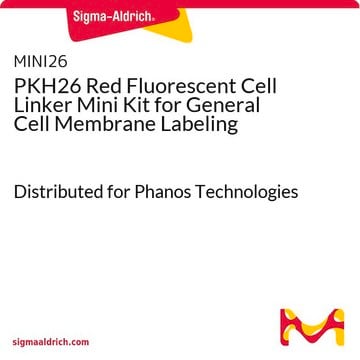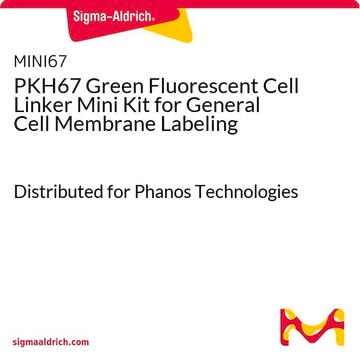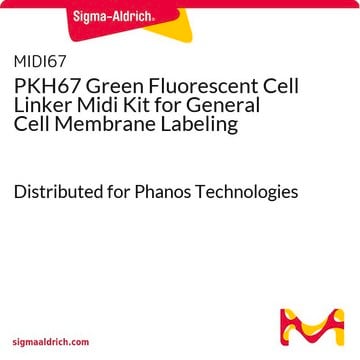PKH26PCL
PKH26 Red Fluorescent Cell Linker Kit for Phagocytic Cell Labeling
Distributed for Phanos Technologies
Synonym(s):
Phagocytic cell label
Sign Into View Organizational & Contract Pricing
All Photos(1)
About This Item
UNSPSC Code:
12352207
NACRES:
NA.32
Recommended Products
Quality Level
Application
This kit is for phagocytic cell labeling. It is used to selectively label cells with phagocytic capabilities such as monocytes, macrophages or neutrophils.
Principle
The labeling occurs through the formation of dye aggregates or particulates. The aggregate formation significantly inhibits the uptake of dye by non-phagocytic cells, such as lymphocytes, but facilitates dye uptake by phagocytic cells. Labeled cells appear patchy or spotted because the dye is localized in phagocytic compartments of the cells. The dye appears to be resistant to metabolic attack and has been found to remain with the cells for at least 21 days in vivo.
Labeling of phagocytic cells by this methodology may be conducted either in vitro or in vivo. Intraperitoneal or intravenous injections of the PKH26 labeling solution will successfully label phagocytic cells in vivo, while cells of interest which have been isolated may be stained using in vitro labeling methods.
Labeling of phagocytic cells by this methodology may be conducted either in vitro or in vivo. Intraperitoneal or intravenous injections of the PKH26 labeling solution will successfully label phagocytic cells in vivo, while cells of interest which have been isolated may be stained using in vitro labeling methods.
Linkage
For additional technical details on PKH and CellVue® Fluorescent Cell Linker Dyes including an extensive bibliography, please visit here.
Legal Information
CellVue is a registered trademark of Phanos Technologies
Kit Components Only
Product No.
Description
- Diluent B 6 x 10
- PKH26 cell linker in ethanol .5 mL
related product
Product No.
Description
Pricing
Signal Word
Danger
Hazard Statements
Precautionary Statements
Hazard Classifications
Eye Irrit. 2 - Flam. Liq. 2
Storage Class Code
3 - Flammable liquids
Flash Point(F)
57.2 °F - closed cup
Flash Point(C)
14.0 °C - closed cup
Certificates of Analysis (COA)
Search for Certificates of Analysis (COA) by entering the products Lot/Batch Number. Lot and Batch Numbers can be found on a product’s label following the words ‘Lot’ or ‘Batch’.
Already Own This Product?
Find documentation for the products that you have recently purchased in the Document Library.
Customers Also Viewed
K Tabata et al.
Gene therapy, 18(10), 969-978 (2011-04-23)
We previously identified the mouse and human Glipr1 and GLIPR1/RTVP-1 genes, respectively, as direct p53 targets with proapoptotic activities in various cancer cell lines, including prostate cancer (PCa). Intratumoral injection of an adenoviral vector capable of efficient transduction and expression
Hiroshi Kanno et al.
International journal of molecular sciences, 14(5), 9604-9617 (2013-05-07)
A specialized population of cells residing in the hair follicle is quiescent but shows pluripotency for differentiating into epithelial-mesenchymal lineage cells. Therefore, such cells are hoped to be useful as implantable donor cells for regenerative therapy. Recently, it was reported
Sung Hoon Baik et al.
Neurobiology of aging, 35(6), 1286-1292 (2014-02-04)
Immune responses in the brain are thought to play a role in disorders of the central nervous system, but an understanding of the process underlying how immune cells get into the brain and their fate there remains unclear. In this
Hansang Cho et al.
Scientific reports, 3, 1823-1823 (2013-05-15)
Progressive microglial accumulation at amyloid-β (Aβ) plaques is a well-established signature of the pathology of Alzheimer's disease, but how and why microglia accumulate in the vicinity of Aβ plaques is unknown. To understand the distinct roles of Aβ on microglial
Hansang Cho et al.
Lab on a chip, 14(5), 972-978 (2014-01-17)
Neutrophils are the most abundant type of white blood cells in the circulation, protecting the body against pathogens and responding early to inflammation. Although we understand how neutrophils respond to individual stimuli, we know less about how they prioritize between
Our team of scientists has experience in all areas of research including Life Science, Material Science, Chemical Synthesis, Chromatography, Analytical and many others.
Contact Technical Service













